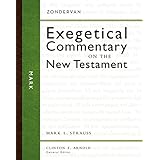 Mark L. Strauss Mark ZECNT; Grand Rapids, MI: Zondervan, 2014. Available at Amazon.com Mark Strauss’ commentary on Mark in the Zondervan Exegetical Commentary series is a delight to read. The Gospel of Mark is my favourite commentary and I’m tad picky about which commentaries on Mark I read and use. But Strauss delivers the goods as he has constructed a useful, thoughtful, and well-written commentary on Mark. Strauss’ approach is very eclectic with a mixture of insights from historical-criticism, social-scientific, and narrative methodologies. He thinks John Mark is the best option for author of the book. Strauss also thinks, despite Bauckham’s protests, that Mark probably had a specific audience in mind (that said, I doubt Bauckham would disagree, he’d only add that Mark probably knew and intended for his volume to circulate even wider). He favors a Roman provenance and a date in the late 60s. Strauss contends that Mark had a variety of purposes in writing,but two broad themes dominant: christology and discipleship. I loved this quote from the intro:
Mark L. Strauss Mark ZECNT; Grand Rapids, MI: Zondervan, 2014. Available at Amazon.com Mark Strauss’ commentary on Mark in the Zondervan Exegetical Commentary series is a delight to read. The Gospel of Mark is my favourite commentary and I’m tad picky about which commentaries on Mark I read and use. But Strauss delivers the goods as he has constructed a useful, thoughtful, and well-written commentary on Mark. Strauss’ approach is very eclectic with a mixture of insights from historical-criticism, social-scientific, and narrative methodologies. He thinks John Mark is the best option for author of the book. Strauss also thinks, despite Bauckham’s protests, that Mark probably had a specific audience in mind (that said, I doubt Bauckham would disagree, he’d only add that Mark probably knew and intended for his volume to circulate even wider). He favors a Roman provenance and a date in the late 60s. Strauss contends that Mark had a variety of purposes in writing,but two broad themes dominant: christology and discipleship. I loved this quote from the intro:
Mark’s story of Jesus reminds us that with the l ife, death and resurrection of the Messiah, God’s eschatological salvation has arrived. The power of death has been broken. The reign of God has been inaugurated for those who will enter it by faith. All who take up their cross to follow Jesus will share in this victory. In the midst of a world of bad news and suffering, this is the ‘good news of Jesus the Messiah and Son of God (p. 20).
To give some other highlights, the “beginning of the Gospel” in Mk 1:1 is the “proclamation of eschatological salvation that came to fulfillment in the life, death, and resurrection of Jesus the Messiah” (p. 61). The kingdom “drawing near” in the sense of spatially in Jesus’ person and temporally in the actions of God to bring salvation (p. 82). Strauss thinks the Syro-Phoenician woman didn’t change Jesus’ mind as much as pass a test set before her (p. 314). Strauss thinks Mk 9:1 that “Some standing here will not taste death before they see the kingdom of God come with power” refers to the transfiguration (p. 376). He takes Mk 13:24-37 as referring to both the destruction of Jerusalem and the parousia of the Son of Man (pp. 589-99). Though he understands Mk 14:62 as referring to both Jesus’ enthronement and his parousia (p. 657). Strauss believes that Mk 16:8 is the intended ending of the Gospel (p. 723).










